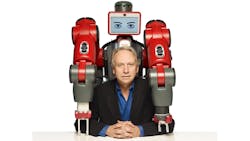Robots, Reshoring and the Promise of the 21st Century
In 2002, Rodney Brooks brought the first real taste of the 21st century into the world and, even better, into our homes.
When it first hit the market, the Roomba – the tiny, autonomous robot vacuum created by Brooks' first major startup, iRobot – represented the pinnacle of high-tech, ultra-modern life.
It was the first definitive sign that the sci-fi future we'd been promised for the new millennia was starting to come true.
However, there was one part of it that didn't quite live up to the promise: manufacturing.
"We were manufacturing Roombas in China at the time," he recalled in his keynote presentation at the 2014 IndustryWeek Best Plants Conference earlier this month.
"I spent a lot of time touring those factories in China all through the early part of the 2000s," he said. "And I found that they were still making a lot of stuff by hand."
Worse, he found that – even at the height of that first digital revolution – outsourced hand manufacturing seemed to dominate the industry. And it still does.
"All of the stuff we buy at Wal-Mart even today is largely made by hand," he said. "The iPad, for example, is reportedly touched by 325 different pairs of hands during assembly."
That, he said, seems like an awful lot of hand manufacturing. Way too much, in fact.
"We've been making stuff by hand in factories for 234 years now," he said. "Using our hands. I wanted to make something to break out of that."
That was only the start, though.
Twenty-first century hand manufacturing in China, he explained, is the result of 50 years of sending domestic production to far flung factories to make our gadgets, gizmos and daily necessities in the cheapest way possible. Even if that means reverting back to 18th century techniques to do it.
That, he said, has cost our country jobs, manufacturing capacity and innovative power, not to mention defying the promise of the 21st century.
"I thought, there had to be a better way," Brooks said. "And I'm robot guy, so of course the answer I came up with happened to be robots… which is pretty convenient, really."
But not just robots. Robots, he noted, have been popping up in factories since 1961 and clearly aren't impacting this trend. Brooks wasn't interested in those robots. He wanted a different robot, one that could tackle this issue directly.
Fast forward 10 years, and he has given us his solution: Baxter.
A New Robot
Brooks' newest company, Rethink Robotics, launched its first product last year: a slow-moving, worker-safe and adaptable little guy named Baxter.
Since its release, Baxter has become the poster robot for a whole new category of industrial automation equipment – so called collaborative robots that are designed around software to make them safe, adaptable and, of course, affordable – Read more about Baxter and the collaborative robots in The New Age of Robotics.
Even by itself, Brooks says, that is a proper technological revolution.
Robots, he explained, haven't really changed much since the first arrived in the 1960s. They are still stand-alone machines, hardware-based and not fully integrated. They are still unsafe for people to be around, still stuck in cages that consume far more floor space for most small factories can possibly spare.
And all of that, he said, is missing the point of 21st century tools.
"Engineers have been on an arms race to make robots more precise and repeatable," he explained. "They haven't worried about making them adaptable or flexible or easy to use."
As a result, only a handful of the 300,000 small manufacturing companies in the U.S. have access to robotics because, he said, there are just too many barriers to entry. So those companies have had no choice but to look abroad – and to all those 18th century practices – for help.
But, Brooks hopes, maybe that can change now.
And that's a fine hope, course and a fine goal – particularly if you are in the robot business like Brooks – but he has some evidence to back it up.
Just a decade after offshoring his own 21st century Roomba dreams to anachronistic hands, "I am proud to say that Baxter is made in the U.S.A.," he announced. "Every custom piece in this robot is made right here in the U.S.A. And we build them cheaply and of high quality."
And that is what 21st century manufacturing should – and now can – be.
About the Author
Travis M. Hessman
Editor-in-Chief
Travis Hessman is the editor-in-chief and senior content director for IndustryWeek and New Equipment Digest. He began his career as an intern at IndustryWeek in 2001 and later served as IW's technology and innovation editor. Today, he combines his experience as an educator, a writer, and a journalist to help address some of the most significant challenges in the manufacturing industry, with a particular focus on leadership, training, and the technologies of smart manufacturing.

